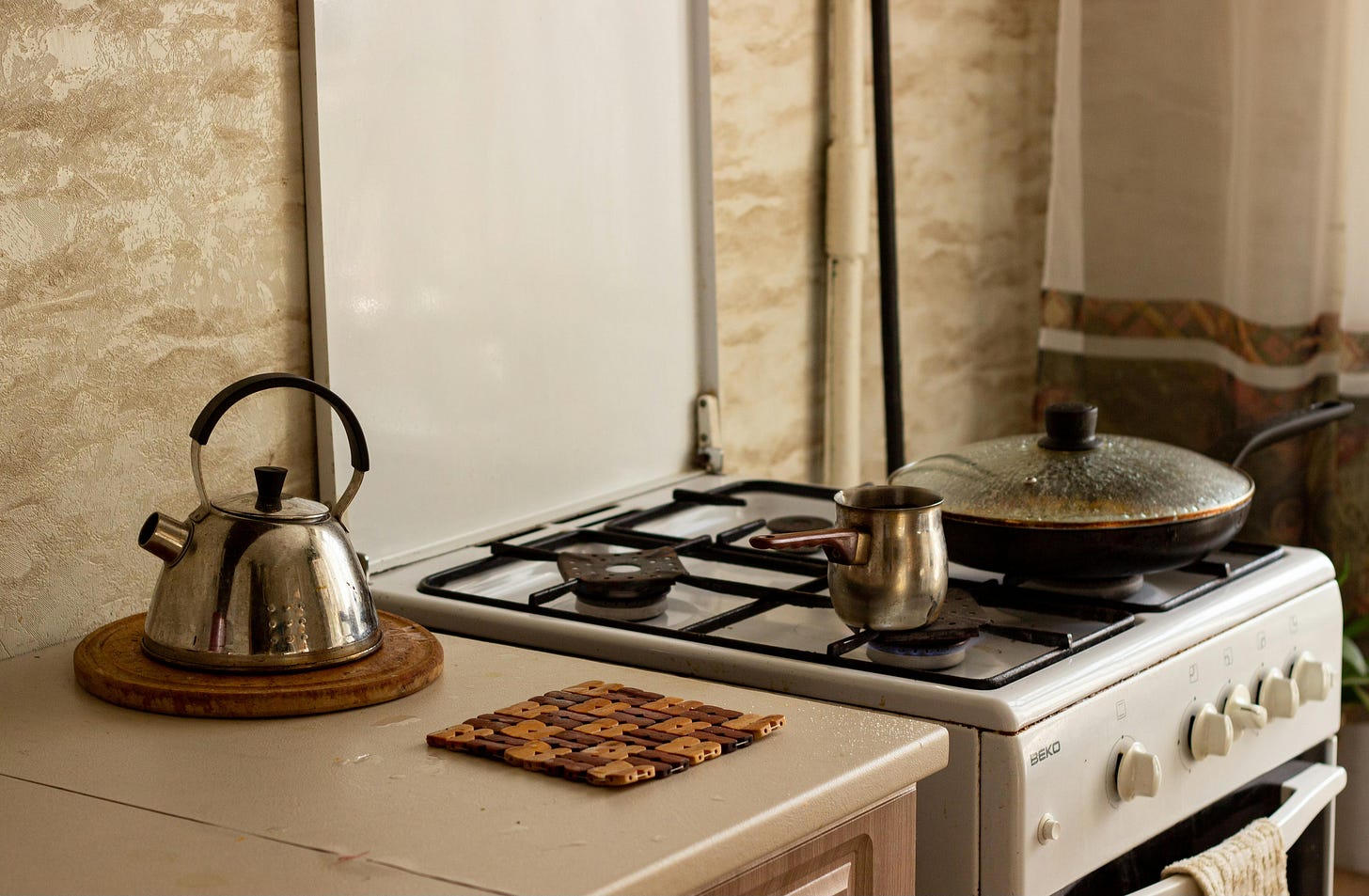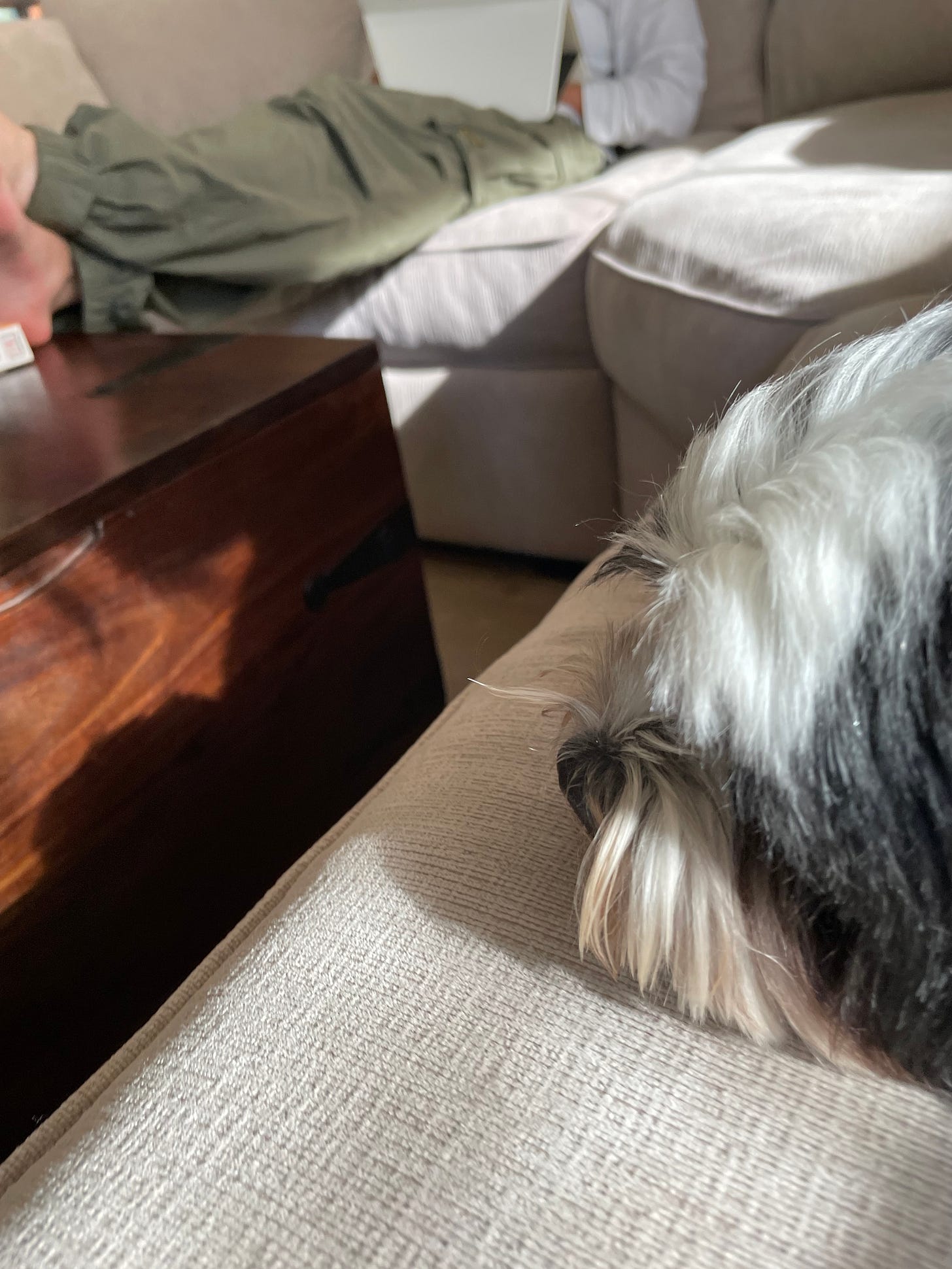It's Not About the Content
The content of experience matters less than how we experience it
Welcome to Beyond Self Improvement issue #136. Every other Wednesday, I share an essay with practical ideas on finding personal freedom in an unfree world.
Dear Friend,
This time last year, I scrolled past a photo Yung Pueblo posted of a resort in Puerto Rico. Exotic and luxurious but somehow organic, like it had materialized effortlessly without human intervention. I paused, thought “That looks cool,” and kept scrolling. That was it.
For most of my life, images like that would capture me. They’d remind me how impoverished I felt and how much I wanted nice things. I’d compare my circumstances to what I was seeing and feel that quiet sense that something was missing. But I haven’t felt that pull in a long time.
Something changed. And it wasn’t my circumstances.
The Content Trap
We all know, intellectually, that stuff doesn’t make us happy. It’s an old theme, maybe even tired. But knowing something intellectually and knowing it emotionally are entirely different things. You can understand this concept and still find yourself scrolling through Condé Nast Traveler at 11 PM, feeling like your life is lacking.
Our culture teaches us that satisfaction comes from outside ourselves. That once we acquire the right things, visit the right places, and curate the right life, we’ll finally be content. We can finally rest. Until then, we hustle.
The writer Joan Tollifson describes visiting her aging mother, who couldn’t always hear the words anymore but could feel the love underneath them. She realized that in their conversations, the content wasn’t what mattered. It was what lay beneath the content. Her mother could feel the love. The words were just an excuse to get together. As that old Louis Armstrong song goes, under all the small talk, what we’re really saying is “I love you.”
This is true for all of experience, not just conversation. We’ve mistaken the content for what actually feeds us. We think the resort, the car, the beautiful home, the exotic vacation (the content of our lives) is what will satisfy us. But content is like the small talk. It’s not the thing itself.
I want to acknowledge something important here: there’s nothing wrong with pleasure. Beautiful things, delicious food, comfortable spaces offer what the Buddha called one-star happiness. Sensory delight is real, and life would be significantly diminished without it. A new car does smell amazing (if you like VOCs). A luxury resort is genuinely beautiful. You’re not wrong to enjoy these things.
The problem isn’t the content itself. The problem is believing that content determines satisfaction.
What I’ve Discovered
Years ago, while on a road trip, I woke up in a tent pitched on dry, late summer grass. When I unzipped the door, one of my flip-flops was missing. A coyote or some critter had taken it during the night, probably for the salt. The sun was streaming across the field and through the trees, lighting everything in gold.
I had one shoe, and I’d slept on hard ground. I was happier that morning than I’ve been in sumptuous settings.
I’ve woken up countless times in a tent and felt profound joy. I’ve seen mist rolling through mountains at dawn. I’ve watched sunlight hit rock formations in ways that awed me. I’ve spent evenings in budget motels, lying on scratchy sheets, feeling completely content.
The luxury resort in the photo? I’m sure it’s lovely. But I see little to no difference between it and that tent with the missing flip-flop. Not because I’ve transcended desire or achieved some enlightened state, but because I’ve learned where satisfaction actually comes from.
It comes from within. It’s something we cultivate internally, not something that happens to us.
The Confession
For my entire life, I denied that I loved beautiful living spaces.
I love architecture. I love interior design, industrial design, furniture design. My parents are incredibly visual, and so am I. Each of them has a remarkable taste for design. Beauty runs deep for me, too. I’m drawn to spaces that blend indoor and outdoor living—mid-century modern, lofts, Spanish-style homes, adobe structures. The texture of walls, the placement of plants, the quality of light through windows, the materials, the colors, the fabrics. I love it all.
But I spent decades denying this truth about myself because I thought wanting these things meant I was spiritually shallow. If I really understood impermanence, if I really grasped the teaching, I shouldn’t care about having a beautiful space, right?
About five years ago, I finally admitted it to myself: I want a cool place, decorated the way I like it, with good light and a view. Something that feels good to me and reflects my values, tastes, and lifestyle. It may be slightly more expensive, but it is within reach.
And here’s what changed: I’m no longer imprisoned by it.
Living in a loft seems like a meaningful experience. I think about the light, the furniture, the act of creative expression. It would satisfy my appreciation for beauty and nurture emotional and psychological well-being.
But I also know that if circumstances prevent it—if the money doesn’t work out, if life takes a different turn—I’ll acknowledge what didn’t happen. And I’ll still be fundamentally okay.
The wanting doesn’t poison my present moment anymore.
The Real Distinction
This goes deeper than talking about adaptation. It’s not just about getting used to new purchases until the shine wears off. It’s about a quality of contentment that’s portable, that you bring with you wherever you go.
Whether you’re sitting alone at home on a cloudy Sunday afternoon, clubbing with friends on a Friday night, or stuck in rush-hour traffic, there’s a contentment available that doesn’t depend on circumstances. You bring the sunny weather with you.
It’s not that staying at luxury resorts is bad. Stay at as many as you want. The problem is if you can only be happy at nice resorts. Because what happens when you lose your money? And people lose money far more often than we’d like to admit, even the most sophisticated among us.
The question isn’t whether to want things. The question is: can you appreciate luxury without being captured by it? Can you see something beautiful and think “that’s lovely” without feeling impoverished?
Can you want something and work toward it while remaining free?
How We Relate to Content
When I look at that resort photo now, I see something exquisite. I appreciate it. My mind doesn’t grasp at it or cling to it in the first place. There’s no story about what it would mean to be there, no comparison to where I am, no subtle sense that my life is lacking something essential.
But when contentment arises naturally from within, it doesn’t fade. I can be sitting in a budget motel room and feel as content as I would at a nice resort. Not because I’m pretending the motel is fancy, but because I understand that the room isn’t creating my experience.
The healing work and ongoing spiritual practices I do (meditation, mindfulness, etc) create the conditions for contentment to arise naturally. I’m not actively generating it. It’s all happening on its own.
When I’m completely available, when my senses are open and I let experience saturate me rather than curating it for some future memory, everything penetrates deeper. The more available I am, the more life reaches me. This is what the Buddha pointed to as three-star and four-star happiness: the happiness of undivided attention and the happiness that exists independent of conditions.
The Invitation
You can verify this in your own experience. You don’t have to take my word for it.
Notice the next time you’re scrolling, looking at images of lives that seem better than yours. Notice the subtle grasping, the fantasy, the quiet dissatisfaction. Notice what it feels like to be captured by content.
And then notice a moment, any moment, when you’re simply present. Maybe washing dishes, maybe drinking coffee, or maybe crawling into bed at night. Notice what it feels like when satisfaction comes from within rather than from circumstances.
The content of your experience isn’t the thing, and it never was.
What matters is how you relate to the content. What matters is the quality of your presence. What matters is discovering that you can foster contentment, like bringing your own weather wherever you go.
If this resonates, share it with someone who’s waiting for the right conditions to be happy. Sometimes we need to hear that we can stop waiting.
Keep being,
Ryan
P.S. This isn’t about rejecting nice things or beautiful experiences. It’s about discovering that your capacity for contentment doesn’t depend on them. Once you see this, you’ll never look at luxury resorts (or budget motels), or anything for that matter, the same way again.




This is what life is about: noticing and appreciating the small things. We seem to get caught up in “bigger” things that don’t really bring us contentment. Thank you for saying it so well.
So well, said Ryan! I love the full circle revelation here. I think it is our tendency to go to one extreme or the other, but the truth you’ve discovered balances it perfectly. I love how you celebrate your unique design and embrace it. But I equally love That having those things in your life you love, doesn’t define who you are, what you are or your experience of life. This was a great essay! Thanks!